Here's my short list of contributors to at least a modicum of Chaos, Confusion, Angst & Fear on campus today. |
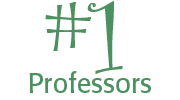 |
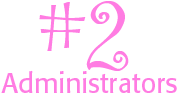 |
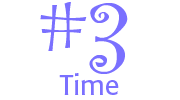 |
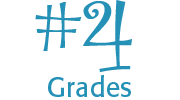 |
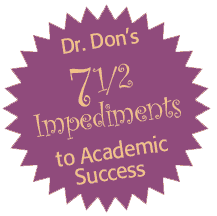 |
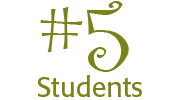 |
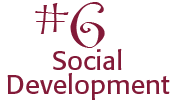 |
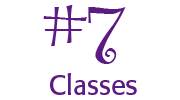 |
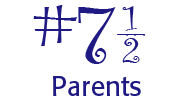 |
In Chaos, Confusion, Angst and Fear...just another day on campus, Dr. Don explains in detail what's behind it all...and how to get ahead of it. Bring the program to campus this year. |
What the Research Says: Issues & Impact on Campus |
| Being a researcher, I have a healthy skepticism of all things researched. However, there’s no question quality inquiry offers some tantalizing tidbits for discussion and some valuable insights. Here we synthesize just a few with their primary question and their major conclusions. We’ll continually update and remark on research great and small that reflects on the challenges of student life today. |
|
Does continued parent involvement affect the maturation and performance of their children when they leave home for college? |
A 2004 abstract observed that fast and inexpensive communication technology has allowed parents to stay close to their children and become more actively involved in their college experience in absentia. The inquiry suggests this can be detrimental as students do not have the opportunity to mature personally and intellectually. Neither does it allow student independence and the development of a more adult relationship with their parents.
|
|
|
Does academic performance improve when students are required to introduce balance into their time management? |
|
In a 2006 study, researchers concluded that academic performance improved among students who work part-time as a result of the structure and discipline required to balance work and study. The study also noted the additional need to balance that new efficiency with increased levels of stress and the reduced time to socialize.
|
|
Do faculty and students share the same perception of educational goals? |
|
A 2003 study comparing faculty and student perception on the importance of 52 different academic measures showed the greatest difference between academic versus work and career preparation. Faculty preferred a more traditional academic purpose to higher education while students opted for college as an investment in future income and careers.
|
|
Does a liberal arts education provide the best basis for job preparation and career development? | A 2004 symposium brought together educators and business leaders to discuss the value of a broad based education versus more sharply focused professional and career training. Although in agreement these need not be mutually exclusive, the importance of a well rounded liberal arts education is a consistent message for career success. |
Chaos Theory and The Art of Studentsmanship… Seriously! |
| You know the now classic illustration…a butterfly flaps its wings on a warm, July breeze lifting off the rolling farmlands of central Pennsylvania in an apparently random act of miniscule insignificance. In December off the coast of the Philippines a typhoon rages that, save for the flapping of those butterfly wings months ago and a world away, may never have happened at all…the butterfly effect. |  |
 |
||
the underlying order in those apparently random and chaotic systems. That’s also a key to academic success and a personal sense of comfort and wellbeing. That butterfly that flapped its wings in Pennsylvania Dutch country; it reflects the sensitivity to initial conditions in any |
Recognize that college IS a dynamic and |
environment - your first week on campus in an entirely new system for example. That’s why orientation has become an integral part of the program…an honest effort to minimize those initial divergent behaviors that may create a typhoon when you’re two months into culture shock or two years into the program. In both chaos theory and the art of studentsmanship however, there |
chaotic environment. Look for the patterns in the chaos that surrounds you. Observe your own patterns for coping with them effectively. Manage the divergent |
||
behavior with your new-found understanding…the art of studentsmanship. |
|||
PROFESSORS
They can’t help themselves. On average, these are men and women who have spent pretty much their entire lives until age 30 in school. If you don’t think that’ll mess with your head, try it.
ADMINISTRATORS
These are the equivalent of corporate suits. They run the place. They make everything work. However, they can sometimes be clueless about the needs and the desires of the rank and file beyond survey data and student reps. Mind you, opinions vary; if you ask one, they’ll deny it. But then again, that’s a lot like asking anyone without a sense of humor to raise their hand.
TIME
Time is a problem. Unless you’re on the 5 or 6 year plan (growing in popularity on college campuses across America), there simply isn’t enough time to cram it all in. College today is a time management practicum.
GRADES
I’m for developing the Educational Clearing House Sweepstakes. Open to professors and administrators as well as parents and students, the person who can explain the difference between a B and a B- or a 2.9 and a 3.0 wins a lifetime of subscriptions from our sister sweepstakes The Publisher’s Clearinghouse
STUDENTS
I don’t mean other students, I mean you. You’ve heard the old bromide: You’re your own worst enemy. There’s an unfortunate amount of truth to that. Youth seems hard wired with a self-destruct gene. Since gene therapy for this particular problem hasn’t reached student health services yet, we need to explore some options
CLASSES
I’ve been to literally thousands of meetings in the afterlife that lasted an hour but only deserved 10 minutes. I’ve taken many classes – and taught a few – with the same problem…information overload and self-important diatribes. The sad truth is information often gets in the way of education.
PARENTS
Coming out against parents doesn’t make me popular, but it doesn’t make me wrong either. Don’t misunderstand me here, I have them, I love them, couldn’t have done without them. That doesn’t mean they didn’t screw me up just a little. Their work for the forces of good or evil tends to surface in college
SOCIAL DEVELOPMENT
What good is knowing the MLA Guide to proper footnote annotations if you can’t get a date. Life doesn’t stop in college, it adds a layer. Study or hook up? Hook up or study? Hmmmm????? This is one of the few no-brainers in all of collegedom!